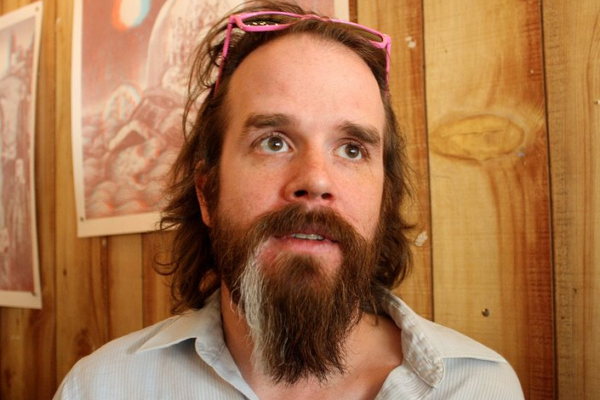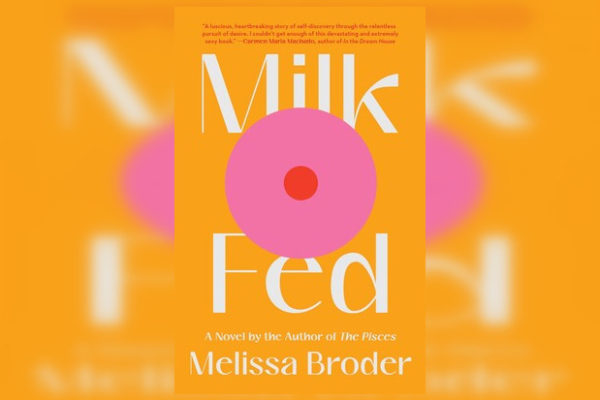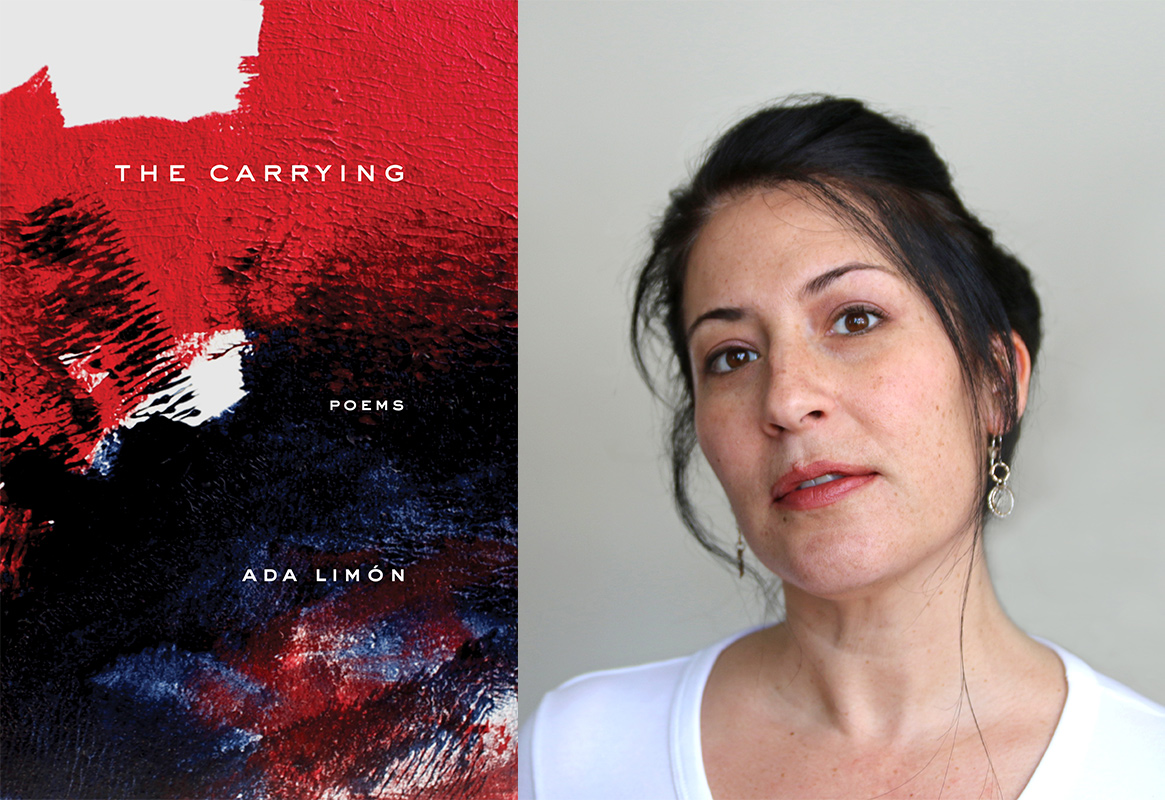by Kayla Tanenbaum
There’s a good story behind the genesis of Adam Robinson’s award-winning small press, Publishing Genius. Adam was pursuing an MFA in “Creative Writing and Publishing” at the University of Baltimore when he received an assignment to present a unique journal idea that deconstructed the notion of what a journal could be. On telephone poles, Adam hung up poems. He put them in shopping carts. He called this assignment an “outdoor journal.” He went on to found Publishing Genius which is now in its 10th year of existence. Robinson also runs the website Real Pants . He works as a publishing consultant, has taught publishing courses in the MFA writing program at University of Baltimore His first book, Adam Robinson and Other Poems, was nominated for the Goodreads Poetry Award, and he self-published his second book, Say Poem, in 2010. Adam is also the editor of Our Primary Focus, a forthcoming e-book about small press culture as described in interviews with writers, book sellers and publishers.
Kayla Tanenbaum is a student at Columbia University’s graduate writing program in the nonfiction concentration. Her bimonthly column features interviews with authors that reveal stories, lessons and realizations of interest to all readers – and to other writers, in particular – and pairs best with these authors’ works, as they emerge, throughout the year. Tanenbaum’s candor and wit slice clean lines across her subjects’ ideas. As an interviewer, she candidly reveals as much about the life of a writer in New York – hers and her subjects’ – as she exposes about the success and authorial presence to which we all aspire.
Kayla Tanenbaum: Tell me about your experience at your MFA writing program. Did you go to that school specifically because of its focus on publishing, or was it a happy accident that you ended up there?
Adam Robinson: Both. I don’t think I would have gone there if they didn’t have that focus on publishing, but I wouldn’t have gone someplace else either. I just kind of happened upon it. They were having an open house, and I was walking down the street. There was a sandwich sign in front of the admissions building and I was like, “Alright. I’ll go check it out.” They waived the admission fee, and I was accepted and I was like, “Alright. Well, they have a focus on publishing.” At that point I had been trying to figure out how to get into publishing, how to run my own small press and so everything lined up really well.
Before and during my MFA I was working in technology procurement at a finance company. The company actually paid for my MFA. I actually got tuition reimbursement for a poetry program from a bank.

KT: Do you think your skills in finance and tech made a difference in the work required to found Publishing Genius?
AR: I want to say yes, but I don’t think that’s the case because Publishing Genius is more a creative and artistic endeavor. My day job is to help other people publish, to help other small presses, to consult with corporations that want to put out catalogues or corporate histories. My past work was more of an IT position, but that office environment certainly showed me how to work for people.
KT: It’s very interesting to me that your day job, so to speak, is kind of in conflict with your passion project. You’re helping your rivals, no?
AR: I do it because it’s a great job that offers me all sorts of flexibility and creative satisfaction. At the same time, it draws from that same creative energy that I use for Publishing Genius, so at the end of the day I don’t have a lot of energy left to devote to Publishing Genius. It’s basically the same job, twice: one I do for money and one I pay to do.
KT: What do you think, for a writer, are the challenges and advantages of publishing with an indie press?
AR: Well there’s great advantages in terms of how much you can learn about publishing and everything that publishing encompasses. You also learn the hard realities about how book sales work in the world.

KT: Why do you think we need indie presses?
AR: Traditional presses aren’t handling literature in the same way that they were historically. The catalog for one of the big five publishers, as they become more and more conglomerated, is focused on the bottom line. That means that they’re publishing more cookbooks, more children’s books, more books that they know are going to be successful. They’re marginalizing literary fiction and poetry. We’ve seeing poetry become completely marginalized in the last 30 to 40 years, and it’s to the point where no poets have an expectation of getting a book published by a traditional publisher. I’d hate to see that same thing happening to literary fiction or creative nonfiction
KT: Do you think that there’s a real risk of that happening? Because I feel like there are about five books of literary fiction that are everywhere in a given year: reviewed everywhere, in everyone’s book clubs… Everybody and their mother read The Goldfinch, for example. It was an excellent book. That book sold so well but, there’s only five of those a year.
AR: There’s not even five of those a year. There’s one of those a year but those books I think the way I understand it, the conventional wisdom is that a book like The Goldfinch, A Little Life, The Girl on the Train are blockbuster books that finance the midlist. I don’t think it used to be that way and I don’t think it’s that way in other countries.
In his amazing book The Business of Books, Andre Schiffrin talks about how Alfred A. Knopf was bought by Random House for around $61 million and no one cared. Look at this merger between Time Warner and AT&T, which is happening now for $80 million. That, people are really concerned about, but the sale of a huge publishing house to another huge publishing house: no one cared about that. There’s something interesting there. Now, the five traditional publishers are all owned by a non-publishing companies. They’re loss leaders at those companies.
KT: Is there a guiding ethos you at Publishing Genius or the other small presses consult to decide which writers to publish?
AR: I’m pretty much a one-person operation, so it’s all about what I think is going to be able to sustain my interest over the publication process. It takes a year from the time a book is accepted to the time it comes out; working on it constantly throughout the year in terms of first the round of edits and then rewrites, then another round of edits and then another round of rewrites, and then design and proofreading and setting up marketing ideas and plans and all that. I want it to be a book that I know is going to be interesting to me when it finally comes out.
Another huge consideration for me is creating a list that’s diverse in terms of the genre, the perspective, and the authors’ backgrounds. Sometimes it seems like it’s detrimental to do that because I’m not just appealing to 24 year old dudes, which I know through looking at the purchase history of the books is my target audience. They really respond to Publishing Genius, 24 year old dudes, but I would die if I was only publishing that kind of literature all the time. I want to publish 70 year old women because they have perspectives that I’m interested in.

KT: Can you talk about the role that you think social media has on book publishing, and if you think that’s a good thing or bad thing.
AR: I see small presses who are starting to expand, and what they do is they bring in more editors and more people with backgrounds and with an MFA and a background in creative writing. If I were able to hire a person it would be a person with a background in technology or whatever new business degrees there are. I’m almost 40. I’m not built for this world anymore. I can feel myself having all these great ideas for ways to harness the power of social media but not being able to act on it because it’s not native to me the way it is to a younger person. Now a publishing house can sell through their Facebook page.
KT: What do you think about people who are social media stars getting book deals based on the fact that they have a lot of followers?
AR: More power to them. What bothers me is that you can’t get a book deal without that.
KT: I know you help a lot of people self-publish. What are your thoughts on that?
AR: On one hand it’s what pays the bills because I’m going to charge a person that’s trying to self-publish differently than I’m going to charge a small press that has the same ethos as I do. I make more when I help a person self-publish. It requires more work because there’s a lot more training that goes on in there. By training, I mean explaining what a book is. One of the first questions I have to have with a person who wants to self-publish is I try to level set their expectations. Teach them that there are no books that sell 100,000 copies. I ask, when’s the last time you actually went out and bought a book? There are writers who don’t buy books themselves, but somehow think everyone else is buying them all the time, and somehow all those people will buy their book. That’s a hard conversation.
My favorite clients are people who love to write and also love to read. Because they like to do that they want to cap off their writing process by putting out the book.
AR: I used to think about this stuff all the time to the point where I should have been on NPR shaking trees and scaring everybody.I haven’t thought about it in a while, but you’re bringing up some old passion.
KT: I think that maybe you should be on NPR scaring people. Maybe I’m just surrounded by like-minded people being in an MFA program, but I know tons of people who care about this stuff deeply.




